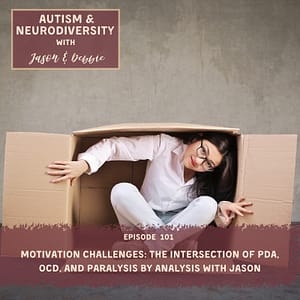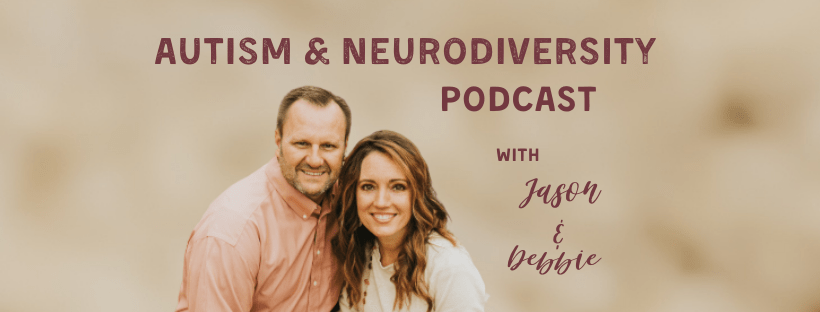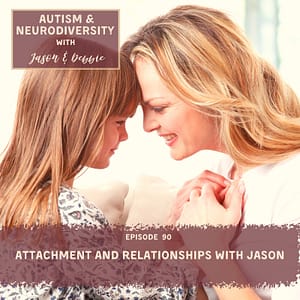[00:03] Speaker A: Welcome to the Autism and Neurodiversity podcast.
[00:06] Speaker B: We’re here to bring you helpful information from leading experts and give you effective tools and support. I’m Jason Grigla, a licensed counselor and founder of Techie for Life, a specialized mentoring program for neurodiverse young adults.
[00:19] Speaker A: And I’m Debbie Grygla, a certified life coach. And maybe most importantly, we’re also parents to our own atypical Young Adults.
[00:30] Speaker C: Hello. This is Jason Grygla with the autism and Neurodiversity podcast. I’m going to talk to you today about one of the ways we can assess how our child is autistic and or neurodivergent based on one of the biggest areas they struggle with and that is attachment and relationships. One of the things that separates autists and or neurodivergents into different groups is hygiene. Another one is independent functioning. Another one is verbal communication, which we often judge and assess their level of functioning based on this one slice of their ability. And if they’re highly capable of communicating verbally we assume that they’re not really very autistic or developmentally disabled, which isn’t true. They can have a heat or spike in their ability to communicate.
Another area is the one I want to talk about today and that is their ability and desire. Two separate questions for how much they want to interact and connect. In our words, we often say, how social are they? That’s not the right question. One person can be completely social from a mean to you scenario and they’re just launching stories and jokes but it’s all one sided and all one way. And you can think, wow, they’re really social. They’re not very autistic. Well, that’s silly because someone who might be very low needs supported autistic could be completely introverted and not be very outwardly social at all but actually be really good at relationships and attachment or better than someone who’s highly verbal.
And so the one thing I want you to look at right now is the person or the people that I work with, do they want interactive two way attachments and relationships or do they not want any relationships or social or in the middle? They want the social, but it tends to look like parallel play or one way where it’s them to those around them. And we learn about parallel play with children in the sandbox where they’re three to six usually and they’re playing next to each other. And because they’re next to each other doing the same thing, they think they’re best friends even though they’ve never actually said a word to each other and they’re familiar with each other and they like the same things and we’re doing the same thing together. So we must be in a great relationship. And the more we develop and grow, the less that’s attractive and enough and intellectually we start to seek out more and more intellectually stimulating interactions.
And so we start to have friends, but certainly not with the opposite sex, right? At least generally speaking. We get along with whoever’s comfortable and then after a while being comfortable with everyone is not that stimulating. I want to interact with people that are and exotic and then oftentimes we become attracted to the opposite sex or to people that are different than us either sexually attracted or just interested and interesting.
I love going to other countries and learning their cultures because I’m fascinated by other cultures and what their strengths and weaknesses are and how they’re different than mine and what can I learn from theirs that I want to bring into my life and vice versa.
Back to this question of does my loved one want to interact? I’ve had a few tough situations recently with some of the best people I’ve ever met. Some of the kindest, nicest, happy, loving, caring people I could ever meet to be a student at Techie for Life, our independent adulting transition program that we run. And they weren’t a good fit. Not because they weren’t ready to go to college, because I think they were smarter than most of the students at the college, but because for our school we rely highly on relationships of influence and mentoring. And no matter how smart the student is or how good they are at getting themselves up on time, following all the rules and doing what they’re asked to do, for my school, there needs to be a level of I want to interact. I want to connect with others. I want to hang out with the group, but I don’t know how, or I’m scared, or I didn’t used to want it, but I think I’m getting used to it. Video games all by myself was enough and now I game online but I’d rather game with friends in person or I used to not even understand why people would be attracted to others or have crushes on others but now I’m starting to wish I had a boyfriend or girlfriend, a romantic love interest.
And we develop into wanting something more. And every time we develop we become uncomfortable in the circumstances we’re in and we seek for more. When someone has a developmental disability oftentimes that need for more is gone. There’s a glass ceiling. And oftentimes they can be very comfortable at whatever rate getting their needs met, they’re at and intellectually. For example, they might read the same stories over and over and over and find them funny every time and never get bored of the same punchline, the same joke, the same characters, maybe relationally. They had a friend in first grade. They’re my best friend and they’re always going to be my best friend. And so even though that best friend moved away, the knowledge that they have a best friend has given them comfort for years without even missing the person. They had that parallel play mentality that I have a best friend and I’m confident and comfortable in that in other ways.
The aspect that is, I think, really hard for us as parents or mentors is we transfer our needs onto the mentee. We assume that because we need, they need. We assume that because we like they like we assume that because my values are the best ones I could find and if they weren’t, I would change them. That they must want to have the same values and drive that I do. And saying it out loud, it obviously sounds crazy because we know we’re all individuals, but I think there’s some subconscious things that go on that we think that are so common for humans to want that the neurodivergent person must want the same.
And there’s a few reasons why that’s a problem. Well, first of all, it puts our loved one, our mentee, into a really bad situation where they feel from us that we want them to accomplish certain things with relationships. We want them to interact because we know how important it is to have friends. We know how important it is to have attachments. We know how important it is to have enough social interactions. But maybe those things don’t apply to them at all. And when we transfer our needs onto them, it’s putting them in a really bad situation where one, they feel like they’re supposed to do it, but they don’t really want to. They get stressed out and overwhelmed and they might become passive aggressive. They might push you away because you’re making them feel bad, or they might feel bad about themselves because they really want to please you. They want to be who you want them to be because they trust you. And then they become behavioral and they start masking.
And I think that’s been the complaint that people have about Aba over the years, is we want them to produce the same action that we want them to produce, assuming that that means they value the same thing. I do think there’s a place for people to do actions first, even if they don’t want to, until they get used to it, like brushing your teeth. It’s worth it to keep at it and hopefully someday they’ll value doing it on their own. So it puts a lot of pressure on them and us if we’re trying to put our values and needs onto them.
So the first question I would ask myself if I were a mentor, and I am, would be what? They actually need one? What do their differences require of them? And their differences fall into two categories. One would be a developmental disability and the second would be their personality type. There’s all kinds of personality types that need higher or lower social. I actually like a lot of social, but I need attachment. Other people need a lot of social, but they don’t need to attach all that much. They’re not into the attachment piece. So world is a little different, but what does my loved one actually need? And I’ve had a couple of students come and apply to Techie for Life where they really didn’t need or want a social connection piece that we provided and offered. They were there because their parents wanted them to take the next steps. They need to learn how to be independent, and they do. They need to learn how to meet their needs so that they have a way to provide for themselves as much as possible. And that’s our job as mentors, is how do we maximize success for them.
So there are programs that focus just on skills. There are programs that don’t focus on skills at all, but they assume you have it all, and they just focus on career. There are programs that focus on relationships and attachments before they focus on career, and that’s really where Techie for Life fits in. For example, we require a student who wants to be mentored or is influenceable, someone who would actually want to go be in a club on campus and participate, but they don’t do it well.
We work with students who want to have more social and attachments and even date, but aren’t sure if they’re ready, and maybe they’re not, but they want to get there. And I think that’s just one more category within the autism spectrum that divides and judges, and it’s really hard, and I don’t like that side of it. I don’t like thinking, okay, we’re just going to box everyone up in these different boxes. At the same time, I think it’s fair to ask, what does my mentee need? Not what do I think they need, but what do they need? And if they really don’t value the connection and it’s not going to benefit them if every time we create a social situation because we’re afraid they’re lonely and they really just play by themselves and they’re happy being by themselves, but they get angry if they have to play with a friend because the friend wants to play differently than they do.
If there’s no drive to connect, then all you’re doing is throwing money down a well, and it’s causing you to be uncomfortable, is the right word. And I don’t have anything wrong with parents meeting their needs. If once a year you want your child to get dressed, get a nice haircut, wear some nice clothes for a family picture, absolutely. Does that mean they’re masking? Everyone’s masking in those pictures? Nobody dresses like that all the time and has a happy smiley face all the time, but that’s okay. That’s an example of an absolutely appropriate manipulation of reality that is, I think, acceptable if it was always like that. We know the families that their parents expect them to look and act like they’re always in a family picture. That doesn’t work. That’s crazy. So there’s a balance.
I remember one mom and dad saying, I just want my son to go to Boy Scouts because it was what was important to me. Is that so wrong? I don’t think so. Not if it doesn’t cause the child a lot of harm. Not if going is actually going to teach them some skills. But it was so worth it to the parents that they worked a ton behind the scenes to front load with the staff leader and even the other boy’s parents with an email where they sent out and said, here’s our son, here’s what he’s good at, here’s what he’s not. He’s not dangerous. He’s not going to be a threat. Would you please talk to your child about what it will mean to my son to have him come and know that the son even valued being there? But it meant a lot to the parents. And you know what, that filled their cup, as selfish as that is in a way that they were able to continue to invest in their son in all the other ways that we’re training. And so it filled the parents cup. That’s good enough. And it didn’t do damage to the sun. He wasn’t against it, but he didn’t really need it or get anything out of it, I don’t think.
So when we’re talking about different levels of support needs, I think there’s a cut off of actual ability that is really hard to train and that’s the social interactive piece. Some autists just don’t touch the same way and they don’t do interactive social. An example of someone who attaches but isn’t a social interactive relationship would be someone who gets really homesick, but it’s not for the people and the relationship as much as it is for the familiarity of the home and the schedule and the smells and the food and the consistency of what life was like before. And they’re really homesick because of that. And the parents are like, I don’t know why he’s homesick. We visited him like two or three times a month, home on the phone three or four times a day. And I’m like, well, because he doesn’t really miss you guys. He might miss you if you stopped interacting. But what he really misses is and then go down the list and then it’s like, oh okay.
So they really don’t interact and attach the same way as we do. So it does harm to force them to do social interaction to meet our needs. It helps them to practice social interaction and meet their needs if they actually have that need. But if the only reason they’re doing social things is to please you, let it go, it’s okay. They’re not going to be lonely. If they’re not lonely, they’re not lonely and that’s okay. And if other parents judge you for letting them be, quote, unquote, isolated, welcome to the club.
Everyone has their issues, so we’re going to have to let go of that. I like meeting them where they’re at. And if I can help a parallel place situation turn into an actual attachment as opposed to attachment to familiarity, I love that I always want to ask the question, does my mentee allow me to influence their life? And if not, I want to build that relationship before I start doing any intervening and any interventions.
So that’s a good principle to stand by and understand that not all of us have the Same ability, capacity, or aptitude for attachment. We’re all different socially, and those aren’t the same things. I’m not sure how to apply that, except for in your situation, take a look, assess it, and then decide, what can we do that’s more in line with the reality of my child’s social emotional needs? Good luck, and thanks for joining me. We’ll talk to you again next time.
[15:32] Speaker A: Thanks for joining us on this episode of Autism and Neurodiversity with Jason and Debbie. If you want to learn more about our work, come visit us at JasonDebbie.com. That’s JasonDebbie.com.




